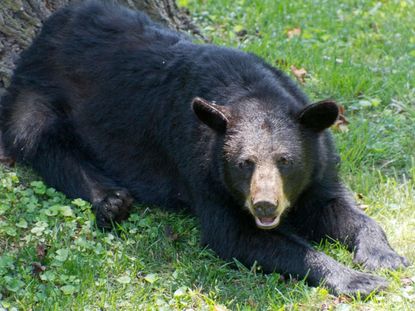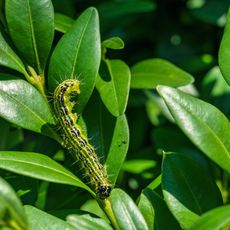How To Keep A Bear Out Of The Garden


For those of you living in rural areas, chances are that you may on occasion have encountered a bear or two. Whether they're trampling the garden or rummaging through your trash, learning how to keep bears away is important.
Bear Control Deterrents
The most common bear enticers include garbage cans, bird or pet food, and grills. They are also adept at digging and will enter gardens looking for roots and tubers, as well as vegetation. Bears also favor fruit trees and vegetables. When making plans for bear control, remember that these animals spend lots of time and energy trying to gain access to food. They will even open containers when necessary. How to get rid of a bear may be as simple as employing noisy deterrents in the landscape. For instance, loud noises such as boat horns, gunshots, and barking dogs can oftentimes be enough to frighten off bears. In some cases, using chili pepper spray on plants may help.
Keep a Bear Out of the Garden & Yard
Other than employing repellent tactics, you should also spray garbage areas with disinfectants regularly to reduce odors that attract bears. Double bagging and storing in airtight containers are also helpful for stopping bears. Cleaning up grills after each use and keeping all pet food and bird feeders put away is another good idea. For those with compost piles, be sure not to add any meat or sweet scraps. Keep it aerated by turning frequently and adding some lime to help speed up the decomposition process. You could even try enclosing the compost heap with an electric fence. Fencing also goes a long way in protecting garden areas, as well as fruit trees. Remember, bears are good climbers and diggers. Therefore, when erecting a fence, use heavy, chain-link, or woven wire. Keep it at least 8 feet (2 m.) high with another 2 feet (61 cm.) below the ground. Install a strand or two of barbed wire or electric fencing along the top as well. Simply using electric fencing (12-gauge wire and a minimum of 5,000 volts) spaced about 4 to 6 inches (10-15 cm.) apart up to 8 feet (2 m.) is also effective. Keeping fallen fruits and vegetables picked up is another good tip.
How to Get Rid of a Bear When All Else Fails
Sometimes even with the best of efforts, stopping bears in their tracks becomes nearly impossible. In these situations, it's often best to contact wildlife professionals that specialize in trapping and relocating bears. If all else fails and if the bear poses a risk to humans, putting the animal down may be necessary. However, this is normally a last resort and should only be attempted by professionals, and only after you have gotten permission from the local authorities, as it is illegal to kill a bear without proper authority in many parts of the country.
Gardening tips, videos, info and more delivered right to your inbox!
Sign up for the Gardening Know How newsletter today and receive a free download of our most popular eBook "How to Grow Delicious Tomatoes."

Nikki Tilley has been gardening for nearly three decades. The former Senior Editor and Archivist of Gardening Know How, Nikki has also authored six gardening books.
-
 Urban Composting Guide: How To Compost In The Middle Of The City
Urban Composting Guide: How To Compost In The Middle Of The CityUrban composting does not have to be daunting. You can compost in the city, and maybe even try some urban worm composting!
By Mary Ellen Ellis
-
 Shrub Diseases And Pests To Watch Out For
Shrub Diseases And Pests To Watch Out ForShrub diseases and pests can be challenging. Learn how to recognize and eradicate them before they can present a danger to your plants.
By Susan Albert